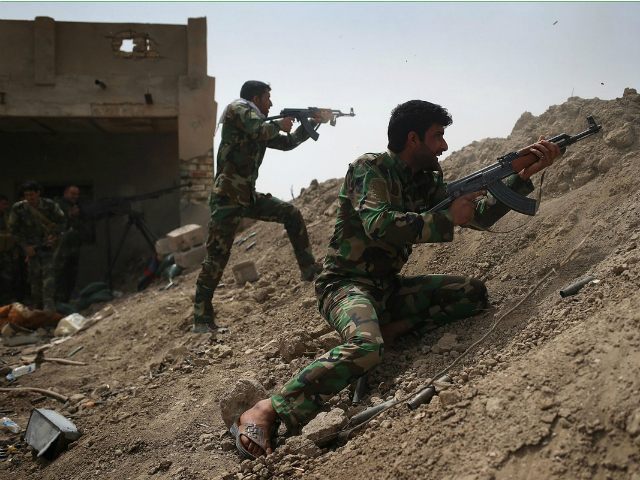Factions of the Iran-backed, largely Shiite militia coalition known as the Popular Mobilization Forces (PMF) began fighting each other on Tuesday in Iraqi territory they wrested out of the hands of the Kurdistan Regional Government (KRG), according to a Kurdish news outlet.
Bas News reported on Wednesday that officials in Kirkuk confirmed the “armed tensions” between Turkmen PMF members and the Shiite Arab Asaib Ahl al-Haq (League of the Righteous) militia. The skirmishes reportedly occurred in the Tuz Khurmatu district of the city where Turkmen militias reportedly eradicated the presence of Kurdish civilians and “looted and destroyed hundreds of properties.”
The PMF is comprised of 67 militias, according to Bas News. Among them are Shiite Arab, Turkmen, and Yazidi factions that united in the fight against the Islamic State, which attempted to commit genocide against all three groups, as well as Christians and any other non-Sunni Muslim civilians. The Iraqi government legalized the PMF as an official wing of the Iraqi armed forces during the fight against ISIS in Mosul.
With the Islamic State gone, the PMF turned their weapons against the KRG, which played a significant role in the elimination of Islamic State factions in Iraq. The Kurdish Peshmerga were heavily involved in the operation to liberate Mosul, Iraq’s second-largest city, from the Islamic State and fought alongside the PMF in that battle. They have also consistently been the most reliable American ally on the ground against ISIS.
Yet in October, following the KRG’s decision to enact a referendum on independence, the Iraqi government invaded KRG territory, particularly the disputed city of Kirkuk. The Kurds had governed Kirkuk since 2014 when the Iraqi army fled an ISIS invasion and the Peshmerga stepped in to defend it. The Iraqi army and its PMF allies invaded Kirkuk and brought it back under Baghdad’s control.
Since the PMF overran Kirkuk and nearby towns, Kurdish officials have complained of a concerted effort to eradicate Kurds from the region entirely. Kirkuk was a multi-ethnic city of Kurds, Arabs, and Turkmen before the invasion, but over 100,000 Kurdish civilians have since fled the city, according to United Nations estimates. Those who have fled tell harrowing stories of abuses by the PMF.
“We fled with our families to save them from rape and to save ourselves from being beheaded,” a Kurdish refugee told Kurdistan 24. “The Hashd al-Shaabi [PMF] confiscated my house, my car, and my money.”
“If the United Nations, Iraq, and the U.S. do not gain control of the situation, the flames of sectarian conflict might lead to the risk of a Kurdish genocide in the Kurdistani disputed areas,” the Patriotic Union of Kurdistan (PUK), a KRG minority party, asserted last month, objecting to Iraq’s “Arabization” of the city.
Asaib Ahl al-Haq, the militia Bas News accuses of engaging in military attacks against Turkmen PMF fighters, is one of the largest groups within the PMF and has close ties to the Iranian government. Asaib leadership have threatened to kill American troops in Iraq. Multiple reports have claimed that Asaib specifically enjoys ties to Iranian Islamic Revolutionary Guard Corps (IRGC) Quds Force leader Gen. Qasem Soleimani, spotted in the Kurdistan region following the Baghdad invasion.
According to a Stratfor report published Wednesday, Iraq approved the creation of an Asaib Ahl al-Haq political party in Iraq this month so it can now field candidates for office.
Some U.S. congressmen have proposed sanctions on Asaib for its ties to Iran. Last week, Rep. Ted Poe introduced a bill to sanction them which argued that Iran has “provided training, funding, and arms” and Hezbollah has “mentored” fighters in the organization.
Yet the United States has supposed the PMF as a whole.
“Before I got here, I read all kinds of things about the PMF, and I got here and I haven’t observed that behavior,” American Lt. Gen. Stephen Townsend, the commander of the U.S. coalition, told the Daily Beast in December. “We’re not having allegations of bad behavior or misconduct.”
In October of this year, Townsend gave the PMF credit for participating in the liberation of Mosul. “Iraqi militia forces, Kurdish Peshmerga fighters, and the [U.S.-led] global coalition also deserve a share of the credit for their sacrifices to achieve this hard-won victory,” he said at the time. The coalition’s public affairs office confirmed to Breitbart News at the time that he meant to include the PMF.
On Tuesday, Col. Ryan Dillon, America’s top spokesman in Iraq, stated that the U.S. has “complete confidence” that Baghdad can control the PMF.

COMMENTS
Please let us know if you're having issues with commenting.